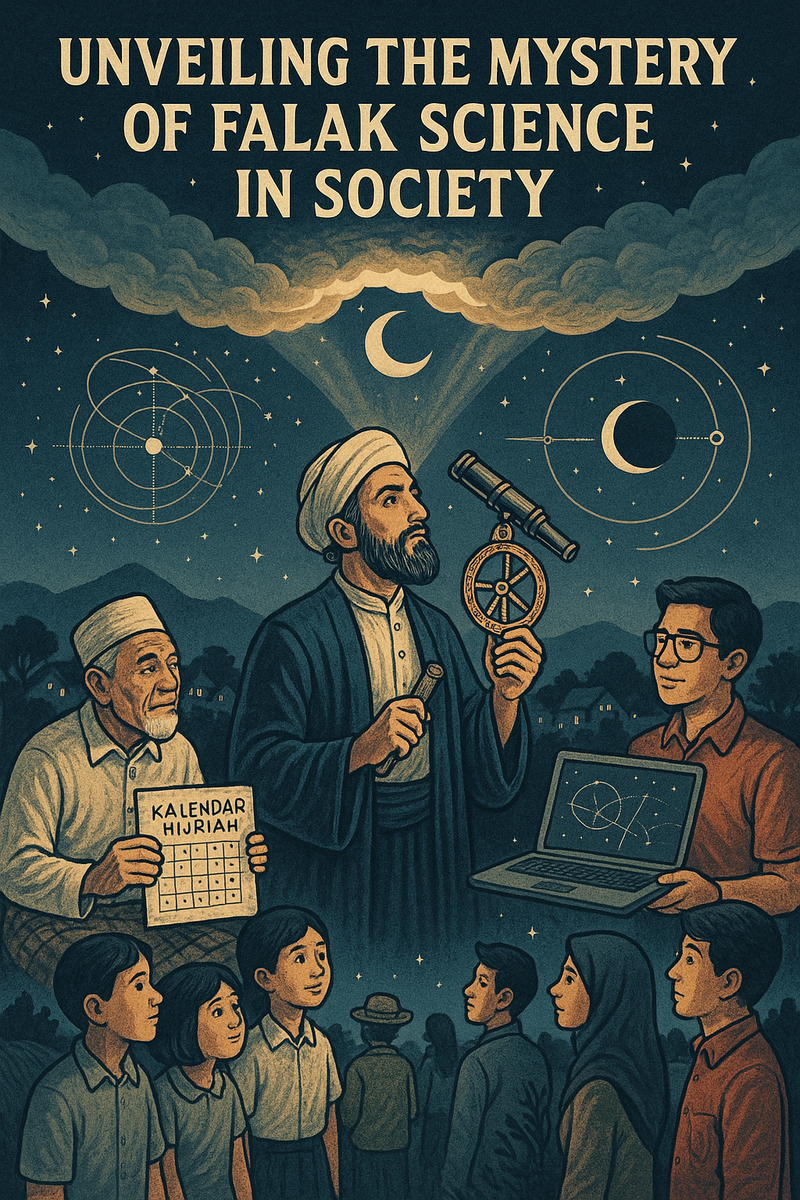Unveiling the Mystery of Falak Science in Society
Falak science, or Islamic astronomy, is a field concerned with the observation and study of celestial bodies such as the sun, moon, and stars. In Islam, this knowledge plays a crucial role in determining prayer times and the beginning of Islamic months, including Ramadan and Eid. However, differences in methods used to determine the start of these months often lead to disagreements and conflicts.
Historically, two primary methods have been used: rukyat (direct observation) and hisab (astronomical calculations). Nahdlatul Ulama (NU) follows the rukyat method, adhering to the Prophet’s hadith that mandates visually sighting the moon before confirming a new month. Conversely, Muhammadiyah employs the hisab method, based on the wujudul hilal principle, which determines the start of a month purely through mathematical calculations without requiring direct moon sighting.
This methodological divergence has existed since the colonial era. During that time, rukyat was predominantly practiced by the Muslim community, whereas the Dutch colonial government relied on a fixed calendar system. Differences in regional altitudes also impacted moon sighting results, leading to variations in the declaration of Eid. This challenge persists today, where disparities in moon sighting continue to result in different Eid celebrations within the same country.
Modern astronomical advancements, including telescopes and digital tools, have significantly improved moon observation. Technologies such as computer programs and satellite imagery have enhanced the accuracy of astronomical calculations. Nevertheless, challenges remain, such as weather conditions obstructing observations and differing interpretations of imkan rukyat (visibility criteria for the crescent moon).
From a social perspective, varying Eid dates sometimes create the perception of disunity among Muslims. However, Islam regards differences as a form of divine mercy, and they should not be a source of division. As a country guided by Pancasila, Indonesia has made efforts to accommodate diverse perspectives in determining Islamic holidays. Government initiatives to unify differing viewpoints through consultation and consensus-building deserve recognition.
To bridge the gap in determining the start of Islamic months, several steps can be taken, including fostering dialogue between Islamic organizations, enhancing public literacy in astronomy, and promoting a standardized Hijri calendar. By doing so, the distinctions between hisab and rukyat can be managed wisely, ensuring they contribute to intellectual diversity rather than discord within the Muslim community.
The Importance of Falak Science in Modern Society
Beyond its role in determining religious observances, falak science has broader implications for society. It intersects with meteorology, navigation, and even space exploration. In the past, Muslim scholars such as Al-Battani and Al-Zarqali made significant contributions to the development of astronomical tables, which were later used by European scientists in their research.
In the modern era, falak science is essential for satellite technology, global positioning systems (GPS), and timekeeping. The precise calculations used in hisab are also applied in determining solar and lunar eclipses, planetary movements, and the synchronization of time zones. These applications highlight the continued relevance of Islamic astronomy in scientific advancements.
Bridging Traditional and Modern Approaches
As scientific advancements continue to evolve, there is a growing need to bridge traditional and modern approaches to falak science. While rukyat remains an essential practice rooted in Islamic traditions, integrating modern astronomical tools can enhance accuracy and reliability. Efforts to standardize criteria for moon sighting across different regions can help reduce inconsistencies in determining important Islamic dates.
Collaboration between religious scholars and astronomers is crucial in fostering a balanced approach. Establishing a unified Islamic calendar based on agreed scientific principles could promote harmony within the Muslim community while preserving the authenticity of traditional methods.
Encouraging Public Awareness and Education
Increasing public awareness and education about falak science can also play a significant role in addressing misconceptions. Many people are unaware of the complexities involved in moon sighting and its scientific basis. Educational programs, seminars, and workshops can help enhance understanding and appreciation of both rukyat and hisab methodologies.
Incorporating falak science into the educational curriculum, particularly in Islamic schools and universities, can equip future generations with the knowledge and skills necessary to engage with both religious and scientific perspectives. The use of digital platforms and social media can further facilitate the dissemination of information on the importance of accurate moon sighting practices.
Falak science remains a vital field that bridges religion and science, offering insights into celestial phenomena while playing a fundamental role in Islamic traditions. Although differences in determining the Islamic calendar persist, fostering dialogue, embracing technological advancements, and promoting education can help create a more unified approach. By acknowledging the value of both traditional and modern methodologies, the Muslim community can ensure that falak science continues to be a source of knowledge, unity, and progress.
![]()
